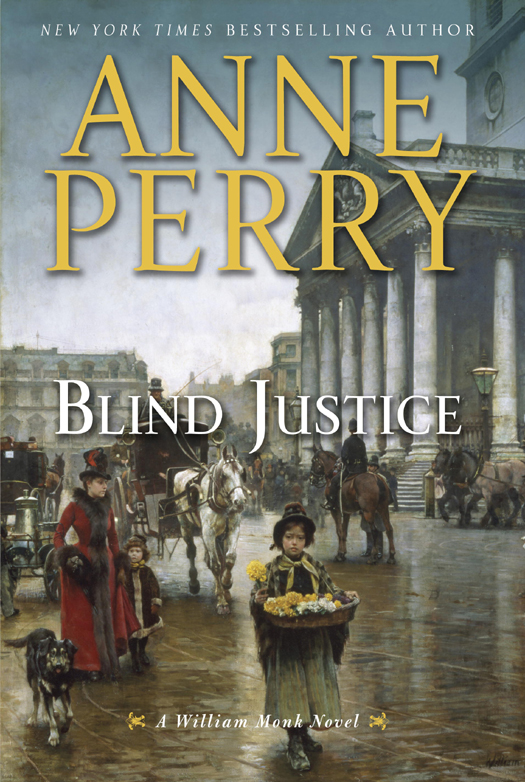
Blind Justice
William Monk Mystery Series, Book 19
کتاب های مرتبط
- اطلاعات
- نقد و بررسی
- دیدگاه کاربران
نقد و بررسی

July 22, 2013
Set in Victorian England, bestseller Perry’s entertaining, if flawed, 19th William Monk novel (after 2012’s A Sunless Sea) poses a complicated moral question. The Thames River policeman’s wife, Hester, can’t help wanting to assist Josephine Raleigh, a nurse who works with her at a clinic for prostitutes and is in despair over her father’s debt, since Hester’s own father killed himself when he was unable to meet his financial obligations. Hester is disturbed to learn that the senior Raleigh’s woes stem from being coerced into making donations he couldn’t afford to a suburban London church, whose leader, Abel Taft, is charged with fraud. A new judge, Sir Oliver Rathbone, a friend of the Monk’s, presides over the trial. The interesting ethical bind Rathbone finds himself facing could have been more sharply framed, and the resolution’s tidiness will be a minus for some. Agent: Donald Maass, Donald Maas Literary Agency.

September 1, 2013
William Monk, of Queen Victoria's Thames River Police (A Sunless Sea, 2012, etc.), steps outside his bailiwick to rescue his friend Sir Oliver Rathbone from a dire fate. It all begins when Monk's wife, Hester, hears from Josephine Raleigh, one of her assistants at the clinic she runs in Portpool Lane, that Abel Taft has extracted so many donations to the poor from his Nonconformist congregants that some of them, including Josephine's father, John, are approaching destitution themselves. Brothel keeper-turned-bookkeeper Squeaky Robinson, pressed by Hester to investigate the Brothers of the Poor, soon reports that precious few of those donations are actually going to the poor, and Taft is promptly put on trial for fraud. Rathbone, newly appointed to the bench, is the presiding judge, and he soon realizes that the case isn't going nearly as well as it should. Under the expert questioning of Taft's barrister, Blair Gavinton, Brothers of the Poor steward Robertson Drew succeeds in making Taft's accusers, including Hester herself, look silly, intemperate or malicious. Suddenly, Rathbone realizes that he has a secret weapon against Drew: an extremely compromising photograph bequeathed to him by his malignant father-in-law, Arthur Ballinger (Execution Dock, 2009), that would utterly destroy Drew's reputation and render his testimony worthless. Should he share the photo with prosecutor Dillon Warne or keep it to himself? After much agonizing, Rathbone decides to share it--and then watches as a stunning development in the case leads to his own arrest for perverting the course of justice. Now it looks as if the imprisoned judge will either rot in jail or fall victim to one of the criminals he'd tried--unless of course Monk and Hester can somehow clear his name. Paring back on her usual period detail, Perry produces her fleetest tale in years. If the courtroom sequences are never exactly surprising, they're guaranteed to produce the deep satisfaction you feel after hearing a series of particularly rousing speeches.
COPYRIGHT(2013) Kirkus Reviews, ALL RIGHTS RESERVED.

November 15, 2013
To clear Judge Oliver Rathbone's name, Victorian London police inspector William Monk investigates the murder-suicide of an embezzling minister's family. While Rathbone languishes in prison for impeding justice, Monk is aided by his wife, Hester, and their adopted urchin, Scruff, to vindicate their friend. This allows the family to summarize the book's moral lessons during dinner table conversations about friendship, loyalty, and honor. Repetitive courtroom scenes are used as templates to nudge the plot forward in scenes that eventually expose a secret society engaged in child pornography and abuse. Davina Porter, a veteran reader of Perry's mysteries ("A Sunless Sea"), is able to embody the era in voices that project the social standing of male and female characters. VERDICT Held aloft by Perry's track record and fan loyalty, this title will likely circulate in libraries that collect her novels.--Judith Robinson, Dept. of Lib. & Information Studies, Univ. at Buffalo
Copyright 2013 Library Journal, LLC Used with permission.

September 1, 2013
In Perry's Victorian history-mystery series starring William and Hester Monk (this is the nineteenth installment), the point of entry for the evil that the couple try to right is the clinic for sick and injured prostitutes that Hester runs. In previous novels, Perry has examined all sorts of Victorian social ills, many of which have their parallels today. She does this, very naturally, by having Hester encounter some poor woman who has been abused or exploited. This time, one of the clinic's workers is upset because her father has been defrauded of his life's savings by the charismatic minister of a Nonconformist church, whose mission is to help people in Africa, while soaking parishioners. William, now head of the Thames River Police, is able to construct evidence of fraud. This book moves rather too quickly to trial, but the focus on series character Oliver Rathbone's handling of the trial as a judge is one of the story's best elements. Perry again delivers searing social criticism with well-drawn continuing characters.(Reprinted with permission of Booklist, copyright 2013, American Library Association.)

























دیدگاه کاربران